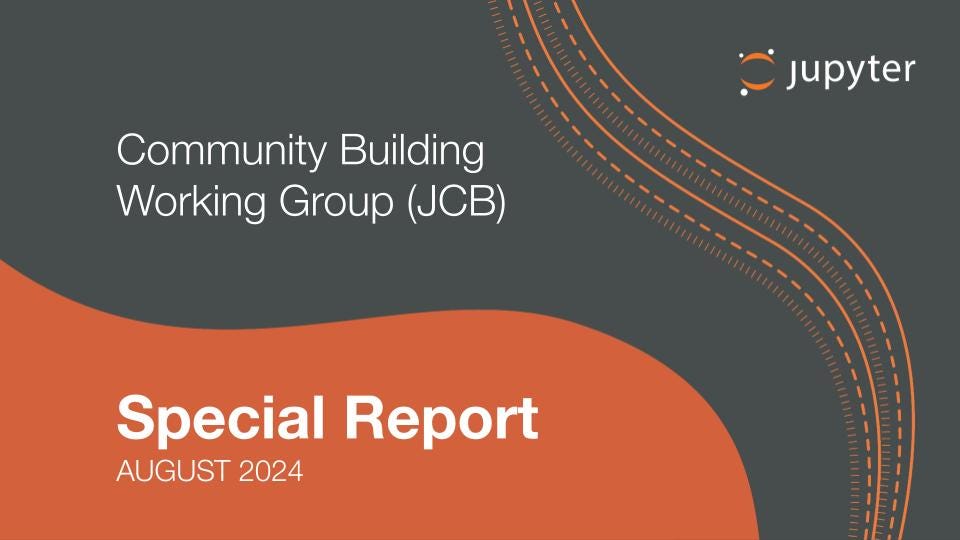
The Jupyter Community Building Working Group would like to share a report and community building recommendations from interviews with members of Project Jupyter subprojects. We invite you to view the full report by clicking here and we welcome feedback on the Jupyter Discourse channel.
Community Building Report: Executive Summary
In late 2023, the Jupyter Community Building Working Group (JCB) launched a series of discussions with subproject representatives to better understand and support their community-building needs: a Jupyter Community Building Survey. The goals of the survey were to understand community-building needs and goals for each subproject, to gather information necessary to advise the Executive Council (EC) on where and what types of resources would be most impactful to meeting these needs and goals, and to identify and share community practices across Project Jupyter.
The JCB used a hybrid approach including a written survey followed by a 30 minute in-depth interview. The report includes our methodology and findings broken out by cross subproject topics and by subproject interviews. A copy of the interview questionnaire is included as Appendix A. This report will be publicly shared and sent to the EC to inspire or serve as a catalyst for strategic activities moving forward. If you have ideas or feedback, we invite you to reach out to us on Discourse.
Here is a brief summary of our recommendations (in no particular order).
1. Create a sustainable events program for subprojects
Project Jupyter should establish stable sources of funding, allocation procedures, and logistical support specifically for subprojects to conduct synchronous, in-person, collaborative meetings on an annual basis. The Project should also provide a way for associated events funded externally to label themselves as “affiliated” or “endorsed” by Project Jupyter.
2. Establish a mechanism for requesting resources
Project Jupyter should establish a procedure for accepting, reviewing, and funding proposals from subprojects. This could include support for external consulting services, infrastructure, or other items that have the potential to benefit the subproject itself and by extension the wider Jupyter ecosystem.
3. Increase Cross Project Coordination
Project Jupyter should create a regular program of Jupyter-wide meetings (virtual and in-person). These meetings should include opportunities to share news between subprojects, discuss best practices and lessons, and also provide opportunities for the wider user community to share information with contributors.
4. Improve onboarding processes for contributors
Project Jupyter should establish a dedicated effort to improve onboarding processes for contributors. This could be a working group, strategic initiative, or paid staff and should focus on creating a more streamlined, consistent, and inclusive onboarding experience for all contributors. An approach that includes code and non-code contributors is important to success.
For more context on these four recommendations and some idea of what next steps are for implementing them, please visit section 4 of the full report.
Acknowledgements
The members of the Jupyter Community Building Working Group — Rollin Thomas (Berkeley Lab NERSC), Martha Cryan (Plotly), Ana Ruvalcaba (Cal Poly, San Luis Obispo), and Jason Grout (Databricks) — would like to thank all involved in this survey. We extend our gratitude to the subproject participants who found time in their busy schedules to respond to our survey questions and meet with us for interviews! We enjoyed learning more about the different subprojects and connecting with their contributors. This report represents a significant investment of time and we hope that its contents will help drive new strategic initiatives at Project Jupyter.
Community Building Report: Project Jupyter was originally published in Jupyter Blog on Medium, where people are continuing the conversation by highlighting and responding to this story.